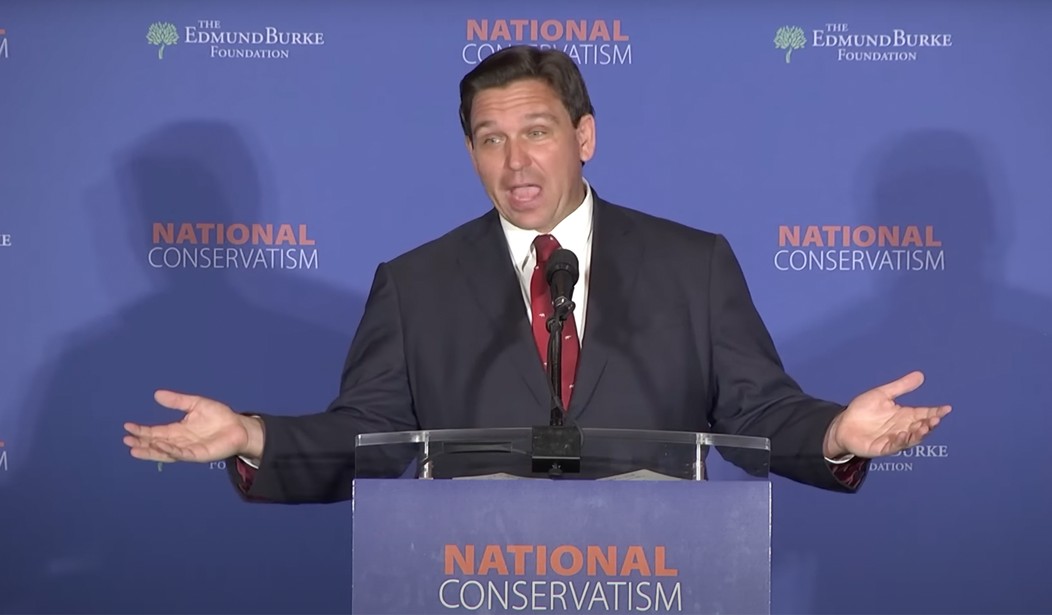As speculation about the future of Florida Gov. Ron DeSantis picks up the pace — you heard about his campaign’s $1.8 million haul after Nov. 3, of course — the inquiry increasingly mentioned isn’t Will he or won’t he?, it’s Does he or doesn’t he?
Have to resign to run for president, that is.
DeSantis’ Democratic opponent, whose identity as the victim of an Election Day mugging is withheld here, raised the question during the campaign’s lone debate in October. With the all the dexterity of Donald O’Connor, DeSantis soft-shoed around it.
So, laying aside for the moment whether he will seek the White House (of course he will), what’s the skinny? Can DeSantis be governor of Florida and be an official presidential candidate?
The answer is an unsatisfying “maybe.” A quick reading of Florida’s resign-to-run statute suggests the governor would have to quit. At some point. From the Miami Herald (paywall):
By all indications, the answer is yes, said Jon Mills, constitutional law professor at the University of Florida.
Florida law requires elected officials seeking a federal, state or local office while serving in a current one to resign. The resignation must occur no later than 10 days before qualifying for the federal office, and failure to resign by that date would result in automatic resignation effective immediately.
“The statute in text does say federal,’’ Mills said[.]
However, Mills adds, the statute is vague about the meaning of “qualifying” when it comes to a presidential race. Qualifying is a known thing for local and state offices, but for president? But when does “qualifying” kick in when pursuing the presidency?
“Does it mean you are the final nominee,” Mills says, “or is it when you qualify for the first primary state?”
But, wait. There’s more. A deeper reading postulates a massive hole in the law: Resign-to-run applies only if the federal office-seeker is not simultaneously angling for another term in his/her current office.
That’s the position posted by Pinellas County Elections Supervisor Julie Marcus on her office’s website. It’s also the opinion laid out in a take-no-prisoners guest column for Florida Politics by Gold Coast lawyer Lillian Rodriguez-Baztaken, legal counsel for Ready for Ron PAC.
State officeholders do not need to quit their jobs in order to run for federal office — whether it’s the House, Senate, or presidency. Florida Statute Section 99.012, which governs this issue, has two relevant parts: Sub-sections (2) and (3). Those wrongly claiming DeSantis needs to resign are playing legal gymnastics by improperly conflating the two sub-sections.
Sub-section (2) is straightforward. It provides, in plain English, that a person cannot qualify as a “candidate” (e.g., be on the ballot) for two offices at the same time, including local, state, and federal offices. …
Meanwhile, sub-section (3), which applies to DeSantis, makes it clear that an “officer” (as defined by the Statute) cannot be the holder of a state-level or lower office while running for another state or lower position without resigning.
However, the Florida Legislature specifically and intentionally removed the word “federal” from the list of offices implicated in this section.
In other words, there is no law that prevents DeSantis from holding the office of Governor of Florida while running for president at the same time. This isn’t even speculative: In 2018, then-Gov. Rick Scott didn’t have to “resign to run” — and win — his Senate seat. Under the terribly flawed interpretation now being promoted, Scott’s victory simply could not have happened.
So, clear as the Mud Swamp, right?
The Legislature’s ostensible rationale is prudent: Where reasonable and possible, the state should spare taxpayers the expense (not to mention uncertainty) of special elections. But the statute’s Rube Goldbergian construction means the earnest clashing of legal minds. And who needs that kind of wartime fog when — if — you’re trying to make America Florida?
The Legislature, with Republican supermajorities riding on DeSantis’ midterm election coattails, seems ready to run the statute through reverse osmosis. Should lawmakers tweak resign-to-run to leave no doubt about DeSantis’ options? Heck, yeah, said the Legislature’s leaders. “Great idea,” says Speaker of the Florida House Paul Renner.
Senate President Kathleen Passidomo’s blessing was wordier, but no less certain: “When you think about it, if an individual, who is from Florida, who is the Florida governor, is running for president, I think he should be allowed to do it.”
Would that be creepy, though, remaking law for the benefit of one person? Possibly, although Tallahassee has a history of similar shenanigans. And, if DeSantis’ recent landslide triumph is any indication, it’s doubtful Republican primary voters would very much care.
After all, the runner-up in the recent gubernatorial election tried to make an issue of DeSantis’ probable short-term status. The result was instructive, to say the least: Floridians overwhelmingly preferred the potential of two years of DeSantis to four of the other guy.
So, in all likelihood, DeSantis keeps the governor’s mansion while attempting to upgrade his residence. The trick will be mastering both assignments at once. If DeSantis can govern Florida and campaign effectively, it’s difficult to imagine a better testament to his suitability for America’s highest office.







